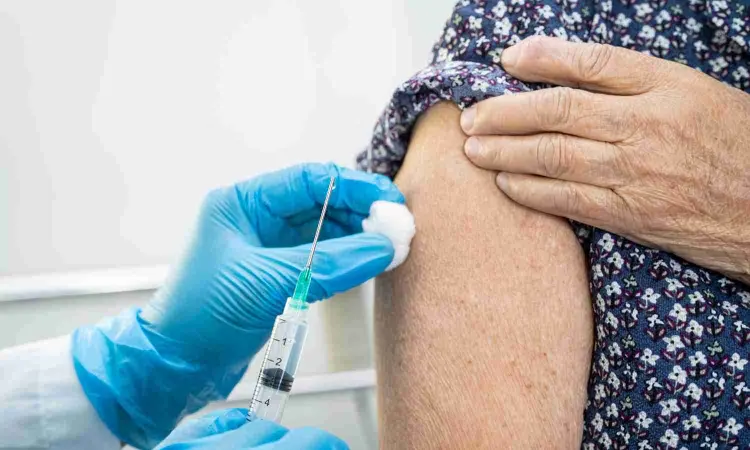- Home
- Medical news & Guidelines
- Anesthesiology
- Cardiology and CTVS
- Critical Care
- Dentistry
- Dermatology
- Diabetes and Endocrinology
- ENT
- Gastroenterology
- Medicine
- Nephrology
- Neurology
- Obstretics-Gynaecology
- Oncology
- Ophthalmology
- Orthopaedics
- Pediatrics-Neonatology
- Psychiatry
- Pulmonology
- Radiology
- Surgery
- Urology
- Laboratory Medicine
- Diet
- Nursing
- Paramedical
- Physiotherapy
- Health news
- Fact Check
- Bone Health Fact Check
- Brain Health Fact Check
- Cancer Related Fact Check
- Child Care Fact Check
- Dental and oral health fact check
- Diabetes and metabolic health fact check
- Diet and Nutrition Fact Check
- Eye and ENT Care Fact Check
- Fitness fact check
- Gut health fact check
- Heart health fact check
- Kidney health fact check
- Medical education fact check
- Men's health fact check
- Respiratory fact check
- Skin and hair care fact check
- Vaccine and Immunization fact check
- Women's health fact check
- AYUSH
- State News
- Andaman and Nicobar Islands
- Andhra Pradesh
- Arunachal Pradesh
- Assam
- Bihar
- Chandigarh
- Chattisgarh
- Dadra and Nagar Haveli
- Daman and Diu
- Delhi
- Goa
- Gujarat
- Haryana
- Himachal Pradesh
- Jammu & Kashmir
- Jharkhand
- Karnataka
- Kerala
- Ladakh
- Lakshadweep
- Madhya Pradesh
- Maharashtra
- Manipur
- Meghalaya
- Mizoram
- Nagaland
- Odisha
- Puducherry
- Punjab
- Rajasthan
- Sikkim
- Tamil Nadu
- Telangana
- Tripura
- Uttar Pradesh
- Uttrakhand
- West Bengal
- Medical Education
- Industry
Timing of COVID-19 shot can change menstrual cycle length, confirms study

Seasonal Covid-19 Uptick Prompts Precautionary Measures Across India
Oregon Health & Science University researchers have confirmed that the timing of COVID-19 vaccination is associated with slight, temporary changes in menstrual cycle length.
The study, published today in the journal Obstetrics & Gynecology, found that individuals receiving a COVID-19 vaccine during the first half of their menstrual cycle are more likely to experience cycle length changes than those receiving a vaccine in the second half.
Building on prior work from the same research team that first identified an association between COVID-19 vaccines and menstrual cycle length, this study furthers understanding of how timing of vaccination is associated with this change.
“Understanding these changes on a population level allows us to more effectively counsel patients about what to expect with a COVID-19 vaccine,” said Alison Edelman, M.D., M.P.H., the study’s lead author and professor of obstetrics and gynecology and division director of Complex Family Planning in the OHSU School of Medicine. “We hope this work helps validate the public’s experiences and ease fears and anxiety around vaccination.”
With data from nearly 20,000 users of the FDA-cleared birth control application Natural Cycles, researchers sought to determine whether timing of COVID-19 vaccination is associated with changes in menstrual cycle length. Individuals in the cohort analysis granted researchers permission to use their de-identified data.
Researchers compared three groups: individuals vaccinated in the follicular phase, the first phase of the menstrual cycle when the body collects follicles, or small sacs that have the potential to release an egg for fertilization during ovulation; individuals vaccinated in the luteal phase, the second part of the menstrual cycle starting after ovulation; and an unvaccinated control group.
Analysis shows that individuals who were vaccinated in the follicular phase experienced, on average, a one-day increase in cycle length when compared with their pre-vaccination cycle average. Changes typically resolved in the cycle after vaccination.
While there is now a large body of evidence demonstrating that the COVID-19 vaccine is associated with temporary menstrual cycle disturbances, the exact biological mechanism for these changes is still unknown.
“We are constantly learning about how our bodies work together, but we do know the immune and reproductive systems interact closely with one another,” Edelman explained. “Based on this relationship, it is certainly plausible that individuals may see temporary changes in their menstrual cycle due to the immune response that vaccines are designed to produce.”
Experiencing an unexpected change in menstrual cycles can be alarming. Researchers emphasize that these findings shouldn’t be a cause for concern, but should provide reassurance that, if changes in cycle length occur with vaccination, they are likely to be small and temporary. Individuals who notice prolonged changes in menstruation are encouraged to seek guidance from their clinician.
Since the study’s data were gathered from individuals with regular menstrual cycles pre-vaccine, the team emphasizes that additional research is needed to establish whether observed differences vary in some people who experience irregularities in their cycle. Additionally, researchers hope to better understand how other aspects of the menstrual cycle are affected by vaccination, such as menstrual-related symptoms and menstrual flow.
“Historically, menstruation has not been prioritized in scientific and medical research, which leaves individuals who menstruate with a lot of unanswered questions, especially when they are experiencing something that’s not ‘normal’ for their body,” Edelman said. “Menstruation is a key indicator of fertility and overall health, so understanding these changes is very important to us as reproductive health researchers and to our patients.”
Reference:
Edelman, Alison MD; Boniface, Emily R. MPH; Male, Victoria PhD; Cameron, Sharon MD; Benhar, Eleonora PhD; Han, Leo MD; Matteson, Kristen A. MD; van Lamsweerde, Agathe MSc; Pearson, Jack T. PhD; Darney, Blair G. PhD. Timing of Coronavirus Disease 2019 (COVID-19) Vaccination and Effects on Menstrual Cycle Changes. Obstetrics & Gynecology ():10.1097/AOG.0000000000005550, February 27, 2024. | DOI: 10.1097/AOG.0000000000005550.
Dr Kamal Kant Kohli-MBBS, DTCD- a chest specialist with more than 30 years of practice and a flair for writing clinical articles, Dr Kamal Kant Kohli joined Medical Dialogues as a Chief Editor of Medical News. Besides writing articles, as an editor, he proofreads and verifies all the medical content published on Medical Dialogues including those coming from journals, studies,medical conferences,guidelines etc. Email: drkohli@medicaldialogues.in. Contact no. 011-43720751


